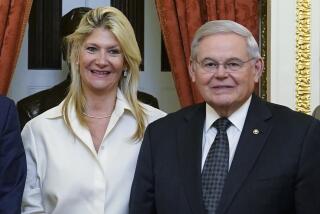Halliburton Role in Probe Criticized
- Share via
WASHINGTON — A Nigerian parliamentary report on allegations that a consortium that includes Halliburton Co. made vast illegal payments to win multibillion-dollar deals accuses the company of playing “hide-and-seek games” with local investigators.
The payments were reportedly made between 1995 and 2002, as the consortium, known as TSKJ, won three contracts worth a combined $7 billion to build a natural gas plant and related facilities.
The report, which was released Wednesday, sharply criticizes Halliburton, the energy services firm, calling on Chief Executive Dave Lesar to come to Nigeria to “make necessary clarifications” before parliamentary investigators.
It also recommends that Halliburton receive no further contracts in Nigeria until all international inquiries have been concluded. French authorities, the U.S. Justice Department and the U.S. Securities and Exchange Commission also have ongoing investigations.
Halliburton has denied the bribery allegations. Wendy Hall, a company spokeswoman, said in an e-mail that the Nigerian report “contains numerous inaccuracies and is based on secondhand information.” She said the company was working with “all government agencies to achieve resolution on this matter.”
The company’s chief executive during some of the time covered by the investigation was Vice President Dick Cheney, who resigned from Halliburton in 2000 to run for the office he now holds. The Nigerian report does not name Cheney, and no evidence has emerged that he knew of any payments that might have been made.
Cheney’s office referred questions about the Nigeria case to Halliburton. Hall said the company had no “information that would implicate” Cheney.
The U.S. Foreign Corrupt Practices Act prohibits American companies from bribing foreign officials. Cheney would be liable only if he knew that such payments were made.
Michael Kulstad, a Justice Department spokesman, declined to comment on the department’s investigation, as did John Heine, a Securities and Exchange Commission spokesman. Halliburton this year announced that it was cooperating with the two investigations.
Halliburton’s share in the TSKJ consortium is held by KBR, a unit formed after the company bought Dresser Industries in 1998. A Dresser subsidiary, M. W. Kellogg Co., formed the consortium to bid on the original natural gas plant contract, awarded in 1995. TSKJ won additional contracts in 1999 and 2002.
The other companies in the consortium -- Technip of France, Snamprogetti, a subsidiary of ENI of Italy, and JGC of Japan -- also have denied that illegal payments were made to win contracts in Nigeria. Although each company holds a 25% stake in TSKJ, the Nigerian report describes KBR as the consortium’s “main driver.”
Allegations of bribery emerged in 2002, when a former top official at Technip told French investigators that the consortium had paid large bribes to win the project.
The investigators subsequently traced about $180 million in payments made by an offshore company set up by TSKJ to a Gibraltar-based firm created by Jeffrey Tesler, a London lawyer representing the consortium.
According to published accounts and sources close to the French investigation, Tesler has said the money was a fee for services he performed or for promotion of the project. He declined a request for an interview.
Investigators in France and elsewhere are trying to determine whether Tesler used the money to bribe Nigerian officials who oversaw the bidding process or paid kickbacks to consortium executives.
Le Figaro, a Paris daily, reported this year that Tesler funneled several million dollars to a Swiss bank account controlled by A. Jack Stanley, who retired as the chairman of Halliburton’s KBR unit last year. Stanley had headed Dresser’s Kellogg subsidiary before Halliburton bought the company.
In June, Halliburton fired Stanley -- he remained a company consultant after stepping down from KBR -- and another official involved in the Nigerian project.
“The terminations occurred because of violations of Halliburton’s
Stanley’s attorney, Lee Kaplan, declined to comment.
The Nigerian parliamentary report says KBR “persuaded other companies in the TSKJ consortium to engage [Tesler’s] services.”
Tesler has long-standing ties to Nigerian officials. “His involvement in business deals there dates back for several decades,” said Patrick Smith, editor of Africa Confidential, a highly regarded London-based newsletter. However, Tesler is not one of London’s better known attorneys.
“If Halliburton had wanted to best protect its interests in Nigeria, it might have been expected to retain a top international law firm with a proven track record,” said Antony Goldman, Africa director of Clearwater Research, a London-based energy consulting firm. “There are some very prominent lawyers in London, but Jeffrey Tesler isn’t one of them.”
Hall said Halliburton had asked its partners to end the consortium’s ties to Tesler. “We are committed to ethical business practices in all of our ventures,” she said in an e-mail.
More to Read
Sign up for Essential California
The most important California stories and recommendations in your inbox every morning.
You may occasionally receive promotional content from the Los Angeles Times.










